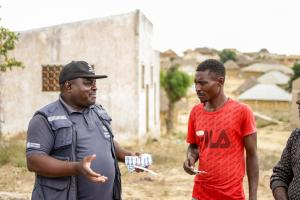Cuanza Sul responds to cholera with community force and mass vaccination
Cuanza Sul, July 2025 - When José Domingos, a resident of the Panda neighborhood in the municipality of Gangula, began to feel pains in his stomach, followed by liquid diarrhea and vomiting, he thought it was just a bad mood. But within a few hours, his condition worsened. "I got really weak, I thought I was going to die. It was the neighbors who took me to the Gangula Health Center. There they said it was cholera," he said.
José managed to be treated in time and is now one of the first people vaccinated against cholera in this new round of vaccinations taking place in several municipalities in Cuanza Sul province. "The vaccinators came by and vaccinated everyone in the house, and we were also given Certeza tablets to treat the water we drink. I feel more relieved. I don't want to go through that again."
The campaign in Cuanza Sul is part of the national cholera vaccination campaign, promoted by the Ministry of Health, with the support of the WHO, GAVI, UNICEF, the European Union and other partners in the sector. This action aims to vaccinate more than 2 million people in six provinces with active transmission of the disease.
In Cuanza Sul, one of the most affected provinces, the target is to vaccinate 837,385 people, aged one year and over, in the municipalities of Boa Entrada, Conde, Conda, Gabela, Gangula, Porto Amboim, Quilenda, Seles and Sumbe.
"Vaccination is one of the main tools we have to contain this outbreak and save lives. We are working hard to achieve 95% vaccination coverage in the areas most at risk," said Dr. Nelson Camilo, Provincial Health Director.
The province has been experiencing constant cases of cholera for months, especially in the municipality of Sumbe, with the highest incidence in the Quicombo commune, which has registered the highest number of notifications. So far, 2,844 cases and 75 deaths have been recorded, according to figures from the health authorities.
The vaccine used in this campaign, Euvichol-S, is a single dose, administered orally, which is safe and effective. It was donated by GAVI and is part of the global effort coordinated by the International Coordination Group (ICG).
On the ground, teams made up of vaccinators, registrars, mobilizers and supervisors are working door-to-door and also at fixed posts in the most critical areas.
Maria Marlene, a nursing technician who was stationed at the Cachoeiras CTC and now vaccinates in the Cachoeira neighborhood, in the municipality of Gangula, shared:
"Now that we have this vaccine, I feel more comfortable, because cholera attacked many people here and many people lost their lives. Thank God, the population is signing up to the vaccine en masse and everyone is committed to protecting themselves."
In addition to vaccination, the campaign has served to reinforce community education, with awareness-raising actions on individual and collective hygiene, water treatment, cleaning the environment and other preventative measures.
The response in Cuanza Sul is being technically supported by the WHO, which has been on the front line since the outbreak began. The work ranges from detecting and investigating suspected cases, supporting treatment centers, rapid response teams and active surveillance, to planning, implementing and supervising the vaccination campaign.
The WHO presence, with 4 professionals deployed in 7 municipalities, is led on the ground by Dr. Manuel Muixi, a specialist with extensive experience in health emergency response, outbreak management and public health. Before supporting Cuanza Sul, Dr. Muixi was involved in outbreak responses in other provinces of the country with a focus on diseases such as: meningitis, measles, polio, muco-bloody diarrhea, among others.
"Cholera control requires an integrated or multi-sectoral approach: drinking water, environmental sanitation, vaccine prevention, proper treatment of patients, rapid response to new cases and active surveillance. The vaccine is just the beginning, the work needs to continue in order to break the cycle of transmission," explained Dr. Muixi.
As well as supporting the Provincial Office and Municipal Health Directorates, the WHO expert leads training, planning, technical supervision sessions, field visits and interactions with community leaders to ensure that the response is effective, locally adapted and well understood by the population.
The campaign continues over the next few days, with strong mobilization of the authorities and partners. In each community visited, vaccination brings with it a dose of protection, but also of hope.
